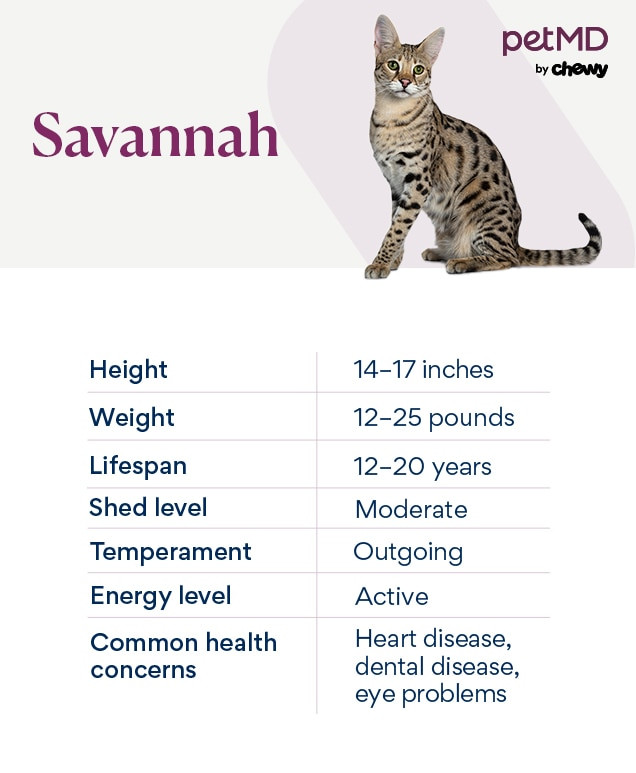The Savannah cat, a captivating breed, originates from the intriguing cross between a domestic cat and the wild African Serval. Boasting striking, wild cat-like coats, these felines possess an undeniably exotic allure. While their appearance and certain traits echo their wild ancestry, Savannahs, when properly socialized, are known to be affectionate and family-oriented house cats.
However, before you welcome one of these unique felines into your home, it’s crucial to investigate state and local regulations regarding ownership. Certain regions may have restrictions, and understanding these beforehand is essential. For example, some areas might have specific rules based on the Savannah’s generation, with higher generations (those further removed from the Serval ancestor) sometimes being permitted where lower generations are not.
The Essentials of Savannah House Cat Care
 chart depicting a savannah cat
chart depicting a savannah cat
Savannahs stand out as a significantly larger breed compared to typical domestic house cats. According to the Savannah Cat Association, first-generation (F1) Savannah cats can reach an average height of 16.3 inches, dwarfing the average domestic tabby at around 9.8 inches. Notably, Fenrir, a Savannah cat recognized as the world’s tallest cat, reached an impressive 18.83 inches!
The generational designation (F1, F2, F3, etc.) indicates how closely related a Savannah cat is to its Serval ancestor. An F1 Savannah has a Serval parent and a domestic cat parent. Each subsequent generation (F2, F3, and so on) signifies a further removal from the Serval lineage. As the generation number increases, Savannah cats generally exhibit a more domestic temperament and tend to be slightly smaller in size. For families seeking a Savannah as a house cat companion, particularly those with young children, F3 Savannah cats and later generations are often recommended due to their typically more mellow personalities.
Beyond their distinctive spotted coats and exotic heritage, Savannahs possess a range of traits that differentiate them from other house cats. They are often described as enjoying water, readily engage in games of fetch, and can even be trained to walk on a leash, making them surprisingly versatile companions.
Savannah House Cat Health Considerations
While generally robust and enjoying a lifespan of 12–20 years, Savannah house cats are predisposed to certain genetic health conditions. Choosing a reputable breeder who prioritizes genetic testing for breeding cats is paramount to ensuring you acquire a healthy kitten. Furthermore, pet insurance can be a valuable consideration to help manage unforeseen health expenses throughout your Savannah’s life.
Pyruvate Kinase Deficiency (PKD)
Pyruvate Kinase Deficiency (PKD) is an inherited condition that affects red blood cell health in cats. It results from a deficiency in the pyruvate kinase (PK) enzyme, leading to the premature breakdown of red blood cells. This can result in anemia and other blood-related issues. Fortunately, genetic testing is available to screen for PKD, enabling responsible breeders to prevent its occurrence in Savannah kittens.
Progressive Retinal Atrophy (PRA)
Progressive Retinal Atrophy (PRA) is another genetic concern for Savannah house cats. This condition causes the retina to degenerate, leading to vision loss. There are two forms of PRA:
- Early-onset PRA: Appears in kittens as young as 2–3 months old.
- Late-onset PRA: Develops later, typically in cats between 2–5 years of age.
The initial symptom is usually night blindness, progressing to complete blindness over time. Although there’s no cure, visually impaired cats can still live fulfilling lives with appropriate adjustments and care. Again, genetic testing of breeding cats is crucial for preventing the transmission of PRA to Savannah kittens.
Hypertrophic Cardiomyopathy (HCM)
Hypertrophic Cardiomyopathy (HCM) is the most prevalent heart condition in cats. In the early stages, HCM often presents without noticeable symptoms. As the disease advances, it can lead to congestive heart failure, with symptoms like labored breathing and lethargy. Regular veterinary check-ups, including echocardiograms (heart ultrasounds), can aid in early detection and management of HCM in Savannah cats.
Dental Disease
Dental disease is a common concern in house cats, including Savannahs. Conditions like gingivitis, bad breath, and periodontal disease can be prevented through consistent dental care. Daily tooth brushing is highly recommended. Routine veterinary dental exams and professional cleanings under anesthesia, when necessary, are also vital for maintaining your Savannah’s oral health.
Nutritional Guidelines for Your Savannah House Cat
Savannah cats thrive on commercial dry and wet cat foods. Selecting a high-quality commercial diet that adheres to the nutritional guidelines established by the Association of American Feed Control Officials (AAFCO) ensures they receive all the necessary nutrients and vitamins for every stage of life.
Optimal Feeding Practices for Savannahs
Savannahs are intelligent and possess a strong prey drive. Enriching their feeding routine with food puzzles, lick mats, and foraging activities can tap into their natural instincts. Mimicking their wild feeding patterns by offering multiple small meals throughout the day, rather than one or two large meals, can also be beneficial.
Determining Food Quantity for Savannahs
Despite their impressive height, Savannah house cats are typically lean and muscular, weighing between 11–20 pounds, depending on their generation. To maintain their athletic physique, it’s important to feed them the appropriate calorie amount based on their age, activity level, and metabolism. Your veterinarian can provide personalized feeding recommendations and advise on dietary adjustments, such as calorie reduction or weight management food, if needed.
Essential Nutritional Tips for Savannahs
A complete and balanced cat food that meets AAFCO standards will provide your Savannah with all the essential nutrients, vitamins, fats, and proteins they require. In certain health situations, your veterinarian may recommend specific nutrient supplements to address any deficiencies or support their overall well-being.
Savannah House Cat Behavior and Training Insights
Savannah House Cat Personality and Temperament
When socialized from kittenhood, Savannah house cats can integrate well into households with other cats, dogs, and children. However, for homes with young children, F3 or later generations are generally preferred due to their typically calmer nature. Often described as more dog-like than feline in their behavior, Savannahs tend to form strong bonds with their families, following their humans around and wanting to be involved in household activities. They are also known to be vocal and will readily meow to communicate their needs or desires. While adaptable to apartment living, providing ample vertical space with cat trees, scratching posts, and shelves is crucial for their well-being.
Savannah House Cat Behavior Traits
Savannahs are energetic and playful house cats, more inclined to be active than sedentary. Without sufficient stimulation, they may exhibit destructive behaviors like scratching furniture or other unwanted outlets for their pent-up energy. Providing ample opportunities to climb, scratch, jump, and play is essential. They are known for their impressive jumping ability, rumored to reach spans of up to 8 feet!
Savannah House Cat Training Potential
Savannahs are highly intelligent and thrive on mental stimulation, reflecting their Serval heritage. Their intelligence and strong bond with their owners make them highly trainable. They can be successfully trained for leash walking, and some owners even enjoy jogging with their Savannah companions. However, due to their agility and exploratory nature, Savannahs should always be kept on a leash or in a secure enclosure when outdoors.
Engaging Activities for Savannah House Cats
- Using a cat wheel for exercise
- Playing fetch
- Exploring vertical spaces
- Birdwatching from windows
- Foraging for treats
- Solving food puzzles
- Enjoying baths
- Walking on a leash and harness
- Learning tricks
- Playing with other pets in the household
Savannah House Cat Grooming Guide
Savannah house cats, with their resemblance to miniature wild cats, have sleek coats that come in a variety of patterns, including spotted black tabby, silver spotted tabby, black, and black smoke, as well as less common colors like seal, seal lynx, cinnamon, chocolate, and blue. Their ears are notably large, a striking feature inherited from their Serval ancestors.
Maintaining their elegant appearance is relatively straightforward, requiring only routine cat grooming practices.
Savannah House Cat Skin Care
Savannahs generally don’t require specialized skin care. However, if you observe signs of overgrooming, persistent scratching, or skin irritation, a veterinary check-up is recommended to rule out any underlying issues. Savannahs are known to enjoy baths, particularly with cat-friendly bubbles. When choosing a cat shampoo, opt for formulas specifically designed for cats, avoiding harsh scents or drying ingredients.
Savannah House Cat Coat Care
Savannahs have short, sleek coats that are easy to maintain. While they are not excessive shedders, weekly brushing is beneficial to remove loose hair and keep their coat healthy and shiny.
Savannah House Cat Eye Care
Savannah house cat eyes do not typically require special care. They possess a slightly more prominent brow ridge compared to some other breeds, with eyes angled downwards towards their nose and distinctive dark lines extending from the eyes to the nose. If you notice any changes in your Savannah’s vision, such as bumping into objects or increased vocalization, consult your veterinarian for an eye examination to screen for conditions like PRA.
Savannah House Cat Ear Care
Regular ear cleaning helps prevent ear infections in Savannahs, especially after bathing or swimming. Signs of ear infections include a foul odor, discharge, and ear irritation.
Key Considerations for Savannah House Cat Ownership
Before bringing a Savannah house cat into your home, ensure you can dedicate sufficient time to their need for activity and mental stimulation. Savannahs can become easily bored without daily engagement. These Serval hybrids need ample space to climb, jump, and scratch. Indoor enrichment items like cat wheels, perches, and puzzle feeders are essential for enriching their environment.
While Savannahs can thrive in families with children, dogs, and other cats, proper socialization is crucial, particularly from a young age. For families with young children or those seeking a calmer companion, F3 Savannahs and higher generations are generally recommended as they tend to be less demanding and more docile than F1 or F2 Savannahs. With appropriate care and attention, Savannahs can develop deep bonds with their owners and provide years of engaging companionship.
Savannah House Cat FAQs
Is a Savannah house cat a good pet?
Savannah house cats are excellent pets for individuals and families seeking an active, outgoing, and intelligent feline companion. However, it’s important to be aware that their personality and temperament can vary depending on their generation. For those desiring a smaller and more laid-back Savannah, higher generations (F3 or later) are generally a better fit.
Can a Savannah cat be a house cat?
Yes, despite their wild Serval ancestry, Savannah cats are indeed considered domestic house cats. However, due to their agility and natural desire to explore, they should be kept indoors unless safely confined on a leash and harness or in a secure catio. With sufficient exercise, play, and environmental enrichment, Savannahs can adapt well to apartment living.
Are Savannah house cats cuddly?
Savannah house cats enjoy being around their human families. They are often happy to relax with you on the couch or curl up in bed. However, they are also high-energy cats, particularly the lower generations (F1 and F2), and require a significant amount of daily exercise and playtime.
How much does a Savannah house cat cost?
Savannah house cats can be a significant investment. According to the Savannah Cat Association, they can cost as much as $15,000. F2 and later generations typically range from $1,500 to $9,000.
Featured Image: iStock/Gennadiy Naumov
WRITTEN BY
Janelle Leeson
Freelance Writer

